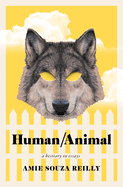
In her debut memoir-in-essays, Human/Animal, Amie Souza Reilly examines a distressing period of her life through the lens of animal metaphors. By engaging with literary theory, she transcends the personal to depict the persistence of societal violence.
For several years, Reilly's family was stalked by the next-door neighbors, brothers in their 60s whose aggression unsettled them. Jim and Wes would peer through the windows of Reilly's house, follow Reilly's husband on his commute, and mow into their lawn. If Reilly failed to return a greeting, they would yell, shaming her for modeling rudeness for her son. Reilly's real estate agent dubbed the brothers "mostly harmless," but other neighbors reported similar interactions. The situation came to a head when Jim and Wes used their vehicle to barricade Reilly and her son in the driveway; she called the police.
"I am looking wherever I can for reasons" for this predator-prey relationship, Reilly writes. To that end, her short bestiary entries offer analogies for human behavior. Animal names, she noticed, are often derogatory when used as verbs: "to badger" is to pester; "to worm" is to manipulate. The interlocking essays also draw on feminist and postcolonial commentary to illuminate the power dynamics imposed by (usually white) men, and how these strictures made Reilly "feel powerless while it rendered them powerful." It's not always apparent how the animal imagery applies, but it's fascinating to watch the connections build, with topics including performance art and slasher films. Meanwhile, the brothers' story is stranger than fiction. Reilly captures the intensity of fear and claustrophobia in an unconventional book ideal for readers of Leslie Jamison. --Rebecca Foster, freelance reviewer, proofreader and blogger at Bookish Beck

